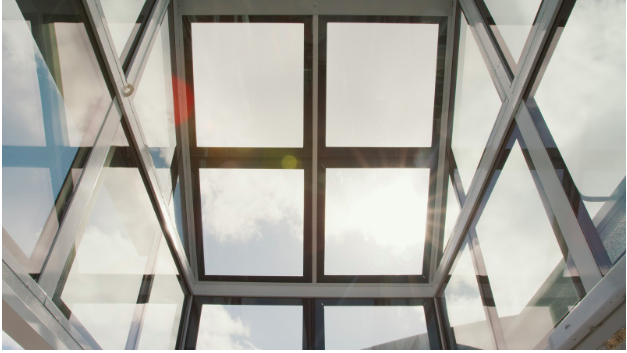From pv magazine USA
ClearVue is a small ASX-listed Western Australia-based solar company looking to generate power from clear windows. It’s another attempt at building integrated photolvoltaics (BIPV).
However, this company’s solar power generation method is very different from conventional silicon or thin-film solar approaches to BIPV.
ClearVue’s transparent luminescent solar concentrator is a spectrally selective polyvinyl butyral interlayer sandwiched between two panes of glass. Most visible light is transmitted through the glass, but infrared light is deflected by inorganic particles in the interlayer to solar cells in the frame. UV light is converted to infrared and also deflected to cells on the window perimeter via total internal reflection.

In 2019, pv magazine Australia reported that ClearVue signed a memorandum of understanding with Taiwanese thin-film CIGS solar manufacturer BeyondPV to supply PV strip modules for use in its insulated glass units and windows.
The CIGS solar strips are applied to the permeter of the integrated glass window units.

Luminescent solar concentrator
A luminescent solar concentrator (LSC) is made from plastic or glass with fluorescent materials or quantum dots in or on it. The hope for the LSC is that cheap dyes or phosphors can make the system inexpensive as well as tolerant of defects or angle.
The luminescent ingredients can be dialed-in to absorb and re-emit at selected wavelengths. Luminophores used in LSCs can be quantum dots, rare-earth ions, nanoclusters and organic molecules. There has been a recent move away from organic dyes towards more stable inorganic phosphors.
pv magazine USA spoke with ClearVue’s CEO Victor Rosenberg and senior staff last week.
Rosenberg said that the window product is absolutely clear and claims:
- Solar conversion efficiency of the window is 3.3%
- The 1.1 X 1.2 meter unit has been tested to UL 61730
- Two OEMs in China are in production
ClearVue wants to license its technology to big glass companies, like Ubiquitous Energy, another clear solar window technology startup.
The glass and window industries are conservative and risk adverse. As Ubiquitous Energy told pv magazine, “It has to work, be efficient and durable — and they still need to see large-size product before they move.”
ClearVue’s path to commercializing an integrated solar window facade is not just an engineering problem. The company has to drive a completely new type of window and curtain wall product through the very conservative building channel — and that’s a daunting marketing challenge — especially for a lossy, pre-product company with limited sales and cash in the bank.

According to an investor presentation, $9 million has been invested in ClearVue over the last eight years.
VC-funded companies such as Israel’s Pythagoras Solar and California’s Solaria tried and failed to commercialize solar windows. Other companies still in the fray include:
- Heliatek’s organic solar cell technology is focused on windows and facades
- Ubiquitous Energy is working on transparent solar window films using organic solar cells.
- SolarGaps builds solar blinds
- Physee’s solar facades
- eni – developed with MIT, eni builds plastic-based luminescent solar concentrators
Author: Eric Wesoff
This content is protected by copyright and may not be reused. If you want to cooperate with us and would like to reuse some of our content, please contact: editors@pv-magazine.com.








6 comments
By submitting this form you agree to pv magazine using your data for the purposes of publishing your comment.
Your personal data will only be disclosed or otherwise transmitted to third parties for the purposes of spam filtering or if this is necessary for technical maintenance of the website. Any other transfer to third parties will not take place unless this is justified on the basis of applicable data protection regulations or if pv magazine is legally obliged to do so.
You may revoke this consent at any time with effect for the future, in which case your personal data will be deleted immediately. Otherwise, your data will be deleted if pv magazine has processed your request or the purpose of data storage is fulfilled.
Further information on data privacy can be found in our Data Protection Policy.